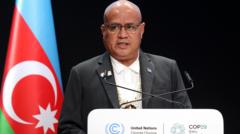The recent COP29 talks in Baku fell short of expectations, with critics calling out the financial pledges as inadequate for truly addressing the climate crisis.
U.N. Climate Negotiations Conclude Amidst Controversy Over Effectiveness

U.N. Climate Negotiations Conclude Amidst Controversy Over Effectiveness
Despite reaching a deal, developing nations deem commitments insufficient for climate adaptation.
Negotiators at the United Nations climate summit, COP29, concluded their discussions early yesterday with an agreement aimed at assisting developing nations in transitioning to clean energy and adapting to climate change impacts. Wealthy countries have committed to ramping up annual financial support from the current $100 billion to $300 billion by 2035. However, this pledge has been met with sharp criticism as many delegates argue it significantly underestimates the vast financial needs of developing nations, which independent experts estimate at $1.3 trillion annually.
As the summit closed, it was clear that while an agreement was reached, divergent interests and expectations remain at the forefront. The primary goal this year was to secure the necessary funding to help vulnerable nations mitigate the effects of climate change, particularly in light of the record-breaking heat and extreme weather phenomena witnessed globally.
Despite the deal, it is evident that challenges persist. Nations are still expected to update their emissions-reduction targets in the coming months, with a deadline looming in February. Following COP29, focus shifts to Busan, South Korea, where negotiators will engage in discussions for the first international treaty aimed at combating plastic pollution—another pressing environmental issue.
David Gelles, who reported from Baku, highlighted the crucial discussions taking place at the summit, emphasizing the stark contrast between the expectations of developing nations and the financial commitments put forth by wealthier states.






















